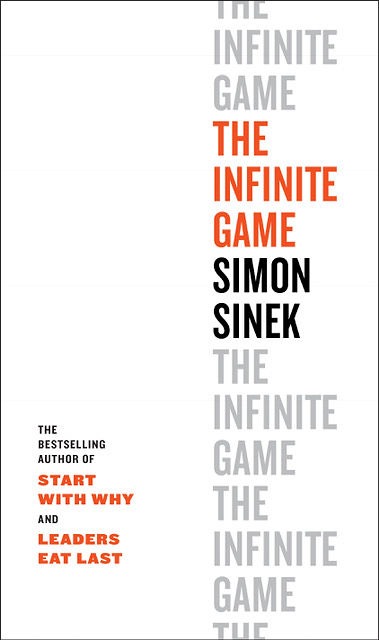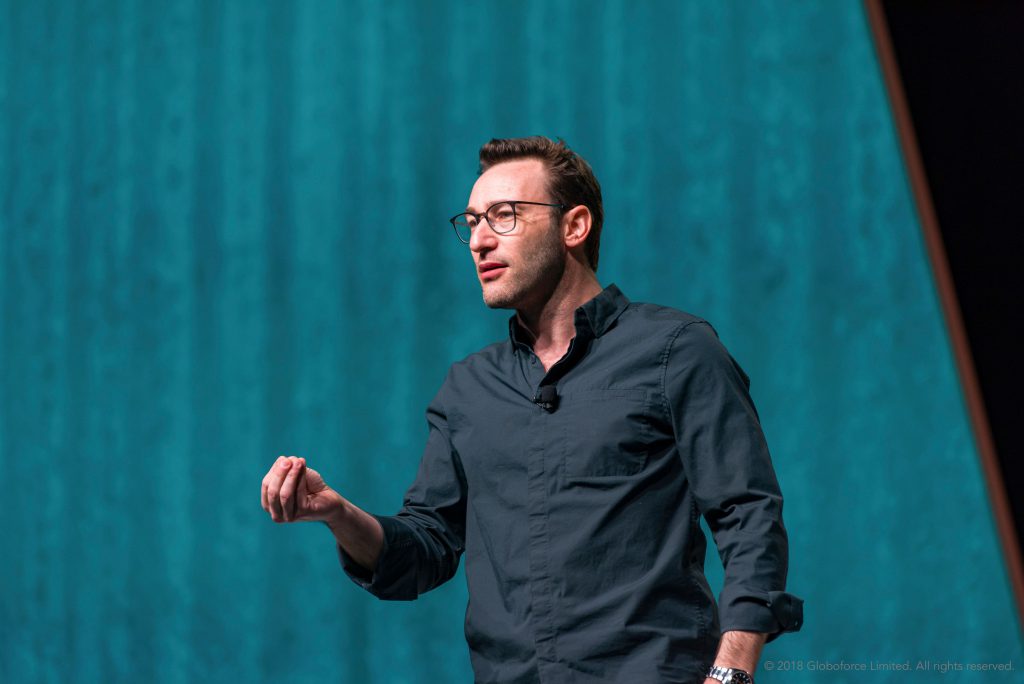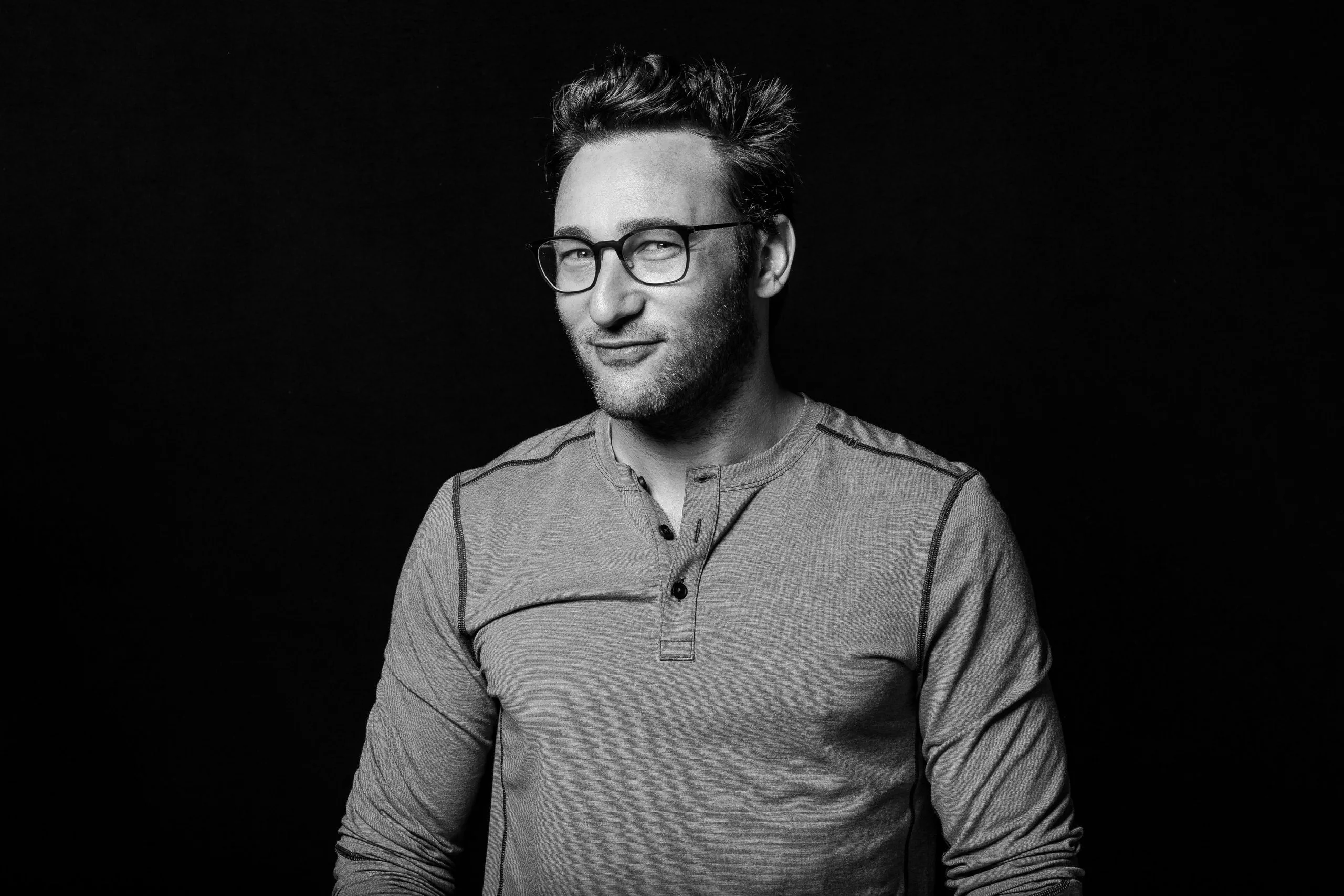We’d be surprised if you hadn’t heard of Simon Sinek. The innovative thinker, whose training and background is steeped in the systematic study of people and cultures, burst onto the scene in 2009 with his TED Talk “How Leaders Inspire Great Action,” which is now one of the most popular TED Talks of all time. In the decade since, Sinek has elaborated on his unconventional approach to purposeful leadership with several bestselling books, including “Start With Why,” “Leaders Eat Last,” “Together is Better,” and “Find Your Why.” In his most recent work, “The Infinite Game,” released this year, Sinek challenges Milton Friedman’s idea of capitalism and offers a definition of the responsibility of business daringly different from the one we’ve been taught for the past five decades. His ideas are contributing to the growing calls for a shift to a more equitable economic system of stakeholder capitalism.

Tell us about your new book, “The Infinite Game.” What is an infinite game, and how does it apply to business?
Simon Sinek: A theologian by the name of James Carse in 1986 wrote a great book called “Finite and Infinite Games,” where he offered this definition: if you have at least one other player — one other competitor — you have a game. There are two types of games. A finite game has known players, fixed rules, agreed-upon objectives, and a beginning, middle, and end; take baseball, for example. Then you have infinite games, which have known and unknown players, rules that are changeable, and an objective that is to perpetuate the game. There is no such thing as winning in an infinite game.
If you think about it, business is an infinite game. There are known and unknown competitors that we compete against, and any player can join at any time. You don’t have to play by the same rules in the way you run your business; anyone can play the way they want. And there’s no such thing as winning in business; there’s no finish line. The problem is, if you listen to most business leaders, they talk about being number one, being the best, and beating their competition. The vast majority of businesses are being run by people with a finite mindset, and when you play an infinite game with a finite mindset, there are a few consistent and predictable outcomes: the decline of things like trust, cooperation, and innovation. Whether we like it or not, we are all players in an infinite game. I wrote the book about how to change our mindset and lead in an infinite game.
What does it mean to have an infinite mindset?
SS: Finite mindsets like to control circumstances and don’t like uncertainty. Infinite mindsets tend to embrace uncertainty and see opportunity in surprises. Most importantly, a finite player plays only for the good of themselves. An infinite-minded player plays for the good of the game, and many conscious capitalists embody this mindset. They want to share with others the techniques and strategies that they’re embracing. It’s good for the game of business as well as their own business. They want to perpetuate the game.

From your point of view, who are some excellent examples of business leaders who are embodying the infinite mindset?
SS: Kip Tindell, the founder of The Container Store. He wants the business to survive him. He wants other companies to embrace what he’s figured out from being willing to make his own company the guinea pig — because he thinks it’s just good for business, and good for capitalism. Garry Ridge from WD-40 believes that his role is to coach his people, make them feel safe at work, and create a space in which the business can continue way beyond him. Bob Chapman from Barry-Wehmiller figured out all these techniques to build an incredible company for 6,000 people — and then challenged himself to take everything he learned and give it to the outside world — again, for the good of business, not just for the good of himself. These are all fantastic examples of truly pioneering infinite-minded players that we should study.
Talk a little about the role of the infinite-game mindset amid Milton Friedman’s ideas of profit maximization and shareholder supremacy, which have become the finite rules by which most businesses play.
SS: The form of capitalism that we have now is not the capitalism that Adam Smith envisioned. It’s bastardized. Milton Friedman theorized that the responsibility of business is to maximize profit within the bounds of the law. But what about ethics? Milton Friedman clearly never ran a business, because if all you focus on is money, your business will break. Even Henry Ford said that business that’s made only to make money is a weak kind of business. There’s only one thing on the planet that is obsessed with growth for growth’s sake — and that is cancer.
Capitalism isn’t the enemy. It’s the modern brand of American capitalism that’s the problem — one that has perpetuated the lies of Milton Friedman and continued to worship people like Jack Welch as a hero. He’s not a hero; he’s an antihero. He titled one of his books “Winning.” There’s no winning in business! Capitalism is a great thing, when it’s done right. Even Adam Smith agreed. When done right, capitalism considers the wellbeing of human beings.

How do we actually change the mindset of company leaders — especially of publicly traded companies — who are already playing by that finite measure?
SS: The way we’ll change it is by more and more people adopting the lifestyle to the point where it becomes normalized. That’s how Milton Friedman’s work became adopted. It didn’t happen overnight; it took 20 to 30 years over the course of the ’80s and ’90s for it to become fully baked into the system. And it’s going to take us another 20 to 30 years to fully bake it out. This is a movement, and no one of us has the answer; we all hold pieces of the puzzle.
It’s really the law of diffusion of innovation that Everett Rogers proposed in the 1960s, which is: we don’t need everyone. We need the early adopters — the conscious capitalists who are questioning the legitimacy of the status quo and thinking, “There has to be a better way to run a business.” We only need a couple of courageous leaders to stand up and say, “I’m going to do it differently and the results will speak for themselves.” I believe in not trying to preach to the status quo, because the people who benefit from the status quo are going to be the most ardent supporters of it. All we need is 15 to 18 percent of business to change their mindset and suddenly we’ve got everybody.
Do we need those courageous leaders out at the forefront to be large publicly traded companies that others are looking to as examples, or can they be small to mid-sized enterprises, as well?
SS: We need all of it. I’m not going to say we need one from the top and one from the bottom — we need top-down, and we need bottom-up. The order doesn’t matter. The quantities don’t matter. It’s really the mindset of the leaders who are willing to say, “I’m willing to do this differently.”
What advice do you have for small-business leaders who are trying to maintain this mindset while figuring out how to make payroll and pay bills week to week?
SS: An infinite mindset is not the absence of finite components. Remember, if you have a beginning, middle, and end, it’s finite. The finite wins have to have context, and the infinite mindset provides that context. We need to win or come out ahead for a reason, so we can continue to have the money to fuel our ambition and our cause. There’s nothing wrong with finite games; the problem is thinking that that’s all there is and that the short-term goals of your company are the reason the company exists. There’s no such thing as a perfect infinite-minded organization or leader because we’re human beings. This stuff is messy. Things like fear, pressure, and incentive structures get in the way.
The best way to continue the infinite mindset is with help from others. None of us is strong enough to resist the temptation of the finite mindset by ourselves. We are all susceptible to it, and we will absolutely stray from the path many times in our journey. But when we have people who show up when we ask for help — because we don’t build trust when we offer help, we build trust when we ask for it. When a submarine commander says, “Go due north,” a submarine doesn’t travel in a straight line. It can’t. It weaves because of currents and all kinds of things, but the crew figures out how to navigate it. They’re constantly going off path. It’s a serpentine route, and any business is a serpentine route. It takes a team of trusting people to bend and weave and stay on the path.
Are your personal purpose and company purpose aligned, or are they different in some ways?
SS: Let’s talk about a “why” versus a just cause. A why comes from your past. It is ostensibly an origin story. It’s who you are, the sum total of your upbringing. Your why is fully formed probably by your mid to late teens, and it’ll never change for the rest of your life. The only question is: are you living in balance with your why? But there’s no changing who you are.
A just cause is the future. It’s where you want to go. Every single person has their own why that is unique to them — just like every single company has their own why, because every company has its own origin story. But a just cause is something we can share — like “All men are created equal” or “I have a dream.” I think people put unbelievable pressure on themselves, this young generation in particular. They think they have to have a vision. You don’t have to have a vision; you have to find a vision. Find one that you believe in and then follow it. You can only have one why, but you can be a follower of multiple just causes.
As it relates to a company, if you’re a founder of the company, then your personal why and your company’s why are exactly the same because your company is one of the things you do to manifest your own why. So of course it’s going to be a representation of you. Virgin is a representation of Richard Branson. Apple is a representation of Steve Jobs. Walmart is a representation of Sam Walton. It is born out of the personalities of the founders.

You recently spoke about the idea of setting your just cause and then not necessarily feeling like you have to have a certain way that you do it. Can you speak a little more to that?
SS: A finite mindset is obsessed with sticking with the strategy, but it’s the destination that really matters. The world changes. Politics change, culture changes, public tastes and trends change, technologies change, so to stick to the strategy in an ever-changing world is just a fool’s game. It’s why companies like Blockbuster — the 800-pound gorilla — went out of business. This little startup called Netflix was letting people subscribe to DVD rentals. The CEO of Blockbuster went to the board and said, “We really should investigate subscriptions as a business model.” They wouldn’t let him change the business model because the company made 12 percent of its revenue from late fees and they didn’t want to give up that revenue. Blockbuster doesn’t exist anymore because they were clinging to the strategy, to the business model. At the end of the day, business models and strategies are just best guesses on how to advance our cause; that’s all they are. When they cease to work or when we see something better, we have to be able to adjust. Too many companies become obsessed with their business plan and strategy at the cost of their own business. For the most part, bankruptcy is an act of suicide.
What are some of the most important things for business leaders to know about purpose?
SS: Purpose is the very reason to have the business. It’s not marketing. It’s not a recruiting tool. It’s not something you just write on your website. It’s not a corporate social responsibility program. It’s the very reason why you started the business in the first place, and it has nothing to do with money.
To be truly purpose-driven, the most senior leader in an organization will still see themselves as subservient to a higher purpose — not to another human being, but to an ideal. We are in service of those ideals, and although we will never actually achieve them, we will die trying, which is the point. It’s about progress, not just prosperity. Prosperity is counting what comes in; progress is counting how far we’ve moved down an infinite path. The people who work at truly purpose-driven organizations feel like they belong, that this is their calling — and it has nothing to do with the business or the product. Barry-Wehmiller makes machines. WD-40, for heaven’s sake, makes lubrication. Who cares? These are not sexy businesses. And yet the people who work there feel like they’ve found their tribe. People confuse the sexiness of a company with purpose. That has nothing to do with it. They’re using their products to advance a calling greater than themselves.
What are some things people get wrong about purpose?
SS: 1) Growth is not a purpose. 2) A corporate social responsibility program is not a purpose. That’s just the business word for giving to charity. 3) Moonshots are absolutely big and long-term, but they’re still finite. They’re just long-term, finite, inspiring things. Moonshots — then what, another moonshot? They’re fantastic, but they’re not purpose. They’re just bold goals that help you advance your purpose. People often get them confused.
When you read the vast majority of corporate missions and vision statements, they’re quite egocentric. “To make the highest quality X at the best possible price, offering the most value.” It’s egocentric and it’s grounded in the product — and as we just said, true purpose has nothing to do with your product. In fact, your vision statement should be a statement of the future you imagine, and the mission statement should be about how you aim to get there. And there should be no mention of the product whatsoever.
Steve Jobs’ message was, “I want to empower people to stand up to Big Brother.” Where does that say “computers”? Barry-Wehmiller says, “We measure success by how we touch the lives of people.” Where does that say “making machinery”?
As a leader, what are you struggling most with right now?
SS: I think my struggles are the same as everybody else’s. I get in the way of myself a lot. I could improve a lot of skills. I could be a better listener. I could be less impulsive. Because I talk about this stuff, you would think that my business would be problem-free and that we get everything right. No. We have all the same problems as every other company. We have employee issues, innovation issues, and the stresses of making payroll. But the way you exemplify the infinite mindset is by the way you respond to the challenges — not by a lack of challenges. It’s like courage. Courage isn’t the lack of fear. It’s being afraid and doing it anyway. If you talk to Navy SEALs and US Marines, they’re damn scared when they go into battle. The reason they’re able to do it is because they have comrades to the left and to the right of them who make them feel safe. It’s the people who give them the courage; it’s not something ingrained in them, necessarily. It’s the entire system that says, “I got you.” They do it for each other. That’s why they run into battle. It’s not different for a business. It’s not the absence of problems; it’s how we respond to them. And we respond to them as a team.
What is giving you hope for the world?
SS: The fact that your magazine exists and people read it. The fact that I have a career. I shouldn’t have a career. In the ’80s and ’90s, I would’ve never been offered a book deal. So the fact that there’s interest in even calling oneself a conscious capitalist or reading a magazine about it, the fact that you can even have a business writing about this stuff gives me hope. It means that there is demand for this better way of doing business, and the demand is not small. Employees are starting to put pressure on their leaders to start thinking this way. And some forward-thinking leaders are starting to embrace it and find the courage to run their businesses this way. What gives me hope is that momentum is on our side.







